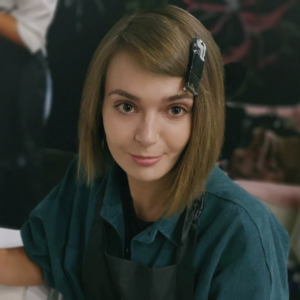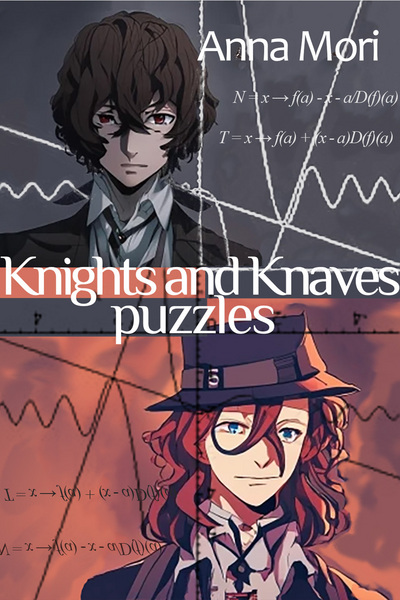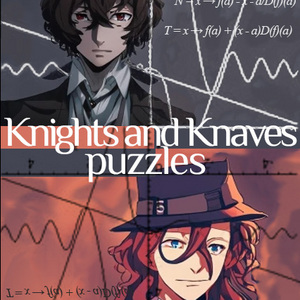***
I must have gravely offended the universe, for misfortunes were raining down upon me in quick succession. Though what followed my encounter with our English guests was hardly a misfortune — more so an inevitability I had been actively avoiding.
The pink elephant, whose specter I had so diligently chased from my thoughts — though, unsurprisingly, with little success. Except, of course, that in my case, it wasn’t an elephant. More like a white tiger.
In short, I was finally forced to meet and speak with Atsushi.
The boy had come straight to the Agency. When I spotted that silvery head through the window — shimmering like the down of a dandelion — my first instinct was to make a disgraceful escape through the back door. His visit was spectacularly ill-timed. I had assumed he would seek me out privately first. Now, the entire Agency would learn of his lost ability, and even the most oblivious Tanizaki would be able to connect the dots to our recent conversation about the Equalizers.
A deeply unpleasant conversation with Fukuzawa awaited me. As did wary, perhaps even reproachful, glances from Ranpo, Kunikida, and the rest. Every so often — when the mask of Dazai-the-carefree-lazy-fool slipped and let something else seep through, like dough overflowing from a too-small pot — they remembered that Osamu Dazai was an outsider in their Agency, a cuckoo’s egg dropped into their warm nest of kindness and humanity. And each time, it took no small effort to make them forget. To stuff that unsightly truth back where it belonged.
All I could hope for now was that my dear colleagues wouldn’t throw a wrench in my plans — or at least, that they wouldn’t have the time. Saturday, the so-called ‘day of reckoning,’ was fast approaching.
Besides, I would, regrettably, require the assistance of some of them. Securing it would have been much easier when they were blissfully unaware of Atsushi’s plight — when the waters were still calm. But alas. It seemed I wouldn’t escape without a public flogging and some requisite repentance.
So, I gathered what little courage I possessed and stayed.
Stayed, and listened as Atsushi recounted his pitiful little tale — of sin, purification, and a bakery. As Akiko led him off for examination and her… unique brand of medical intervention. As he looked at everyone — everyone but me, with an unspoken plea in his eyes, as though I had donned some invisible cloak.
Out of some peculiar sense of knightly honor, Atsushi never uttered a word about my involvement. He told the Agency that he had forgotten nearly everything, save for his desire to rid himself of his sinful ability. But his kindness did me no favors, for everyone else, regrettably, remembered our conversation about the Equalizers all too well. Their gazes all but burned into me.
Finally, unable to bear it, I said, “Look, I already know I’m a bastard — you don’t need to glower at me. Yes, this was my doing, my fault. But I have reason to hope that Atsushi will recover in time, seeing as it’s merely hypnosis…”
“Dazai…” Fukuzawa sighed. “Oh, Dazai. I hope you truly understand why what you did was wrong in more ways than one.”
Right and wrong, ones and zeroes… I knew Fukuzawa was too intelligent to genuinely subscribe to such tiresome moral absolutism. But of course, he had an image to uphold — a good man, wise, compassionate, kind. Nothing like the deranged Dazai, who once again had played his dark little games.
The world would be a far more pleasant place if people cared less about appearing righteous and more about actually thinking, wouldn’t you agree?
No, I wouldn’t have been offended if they had failed to grasp my plan — it was quite intricate, and only Ranpo, I suspect, might have deciphered it (and, in his characteristic sentimentality, deemed it inhumane).
What stung was that they hadn’t even tried to find out why I did what I did. They didn't want to look beyond their noses — and these people still called themselves detectives...
“No, I don’t understand,” I answered honestly.
Fukuzawa only sighed and rubbed his temples. There was no anger in his expression — only weariness, like that of a parent exhausted by a beloved but wayward child.
I had often seen that look in his eyes, and to be perfectly frank, it never failed to irk me. He had no right to look at me that way — I was not his child, nor his student, nor his protégé. If one were to persist with such a metaphor, then I was Mori’s child, his masterpiece, though undoubtedly, in his own mind, a failure. But I preferred not to dwell on that — the analogy led to places far too dark and suffocating.
“…Hate me if you will. Curse my name,” I continued. “But you have known me long enough, well enough, to recognize that my strategies always succeed. I do not err; if a plan has a flaw, then it is not my plan. And believe me, this is the best course of action available. I do not ask you to understand me just yet — only to trust me. Soon, you will see what I intended. For now, all I ask is that you do not stand in my way. I swear, no one from the Agency will come to harm… save, perhaps, myself. I cannot explain everything to you yet — my apologies — but if you believe in me, then do not interfere. Just — do not interfere. And one more thing…” I shut my eyes, then blurted out: “Kunikida, I need you to do a few things with your notebook. And Jun’ichirou, I desperately require your exquisite, marvelous, dazzling Light Snow. A single, small illusion — utterly trivial, and yet a matter of life and death… in particular, my own death. I will most likely need your help on Sunday, at the airport.”
As I spoke, I saw how the tense gazes fixed upon me softened — only for them to harden again the moment I began making requests.
“Uh… I’d like to help, but I don’t know… I…” Tanizaki hesitated. He respected me, was even flattered by my praise of his ability, yet was visibly reluctant to share Atsushi’s fate.
“If anything happens to my brother,” Naomi said sweetly — without the faintest trace of a joke — “I will break your legs and shove them right up your ass.” Her words had the brisk chill of Chuuya’s presence; I felt, bizarrely, a touch heartened.
“I promised, didn’t I? No one from the Agency will be harmed. Darling, you can come with us and see for yourself. If so much as a single hair falls from Jun’ichirou’s head, then you may shove whatever you please wherever you please.” I forced a brilliant, dazzling smile, a meager attempt to dispel the gathering tension.
“Oh, I’ll be coming, rest assured,” she retorted with a defiant glint in her eye. “I’ll be watching, and—”
Fukuzawa intervened.
“No one is going anywhere without my permission. We will discuss our next steps as a team, and as for you, Dazai — I believe you should have a private word with Atsushi. Go take a walk.”
Ah. How tactful of you, Fukuzawa. You might as well have said: Get lost, Dazai. No one wants you here. Not that I was particularly keen to linger beneath their accusing stares myself.
That said, being alone with Atsushi was even less appealing — but, alas, no one cared what I wanted.
We walked along the embankment. The air was damp, the sky a swollen grey, the gulls shrieked piercingly overhead. The city itself seemed caught in the same feverish unease that gripped Atsushi — a tension just before the storm. My Atsushi, with his meek little smile, his gentle eyes that had never glimpsed the darkness within me — eyes the impossible color of lavender and sunlight. In those absurdly short trousers that left his ankles bare (Mori, connoisseur of fragile childlike beauty, would have called them delightfully, temptingly short).
For a while, we walked in silence. Then Atsushi spoke.
“You know how to fix this, don’t you? You always know what to do. You always save everyone.”
I said nothing.
“I don’t blame you,” he added uncertainly.
“Oh?” I let out a mirthless chuckle. “For what, exactly, Atsushi?”
“For… sending me to London. And for what happened there. For what they took from me — my ability.”
I remained silent.
“You knew what could happen. You knew what it meant. You deliberately sacrificed me. Tricked me. Used me and Ryuunosuke as bait, or something like that…”
Still, I said nothing.
“Do you truly believe my ability will ever return?” he asked, almost pleading.
“I don’t know,” I replied evenly.
Atsushi’s voice trembled. “I’m not asking for pity, but… do you really have no justification at all?”
I stopped walking. Atsushi halted too, nearly colliding into my back.
“What do you want me to say?” I asked sharply. “That I didn’t understand what I was doing? That I’m shocked, that I had no idea things would turn out this way? No. I knew exactly what would happen.”
Atsushi bit his lip. He looked as though he might cry.
“…If you blame me, then say it outright. I don’t deny my guilt. It’s always easier when there’s someone to blame. Yes, I bear responsibility for what happened to you, and I will not stoop to excuses,” I went on. “But tell me, Atsushi — if it wasn’t just you, if every single person in the world lost their abilities… who would you blame then? Who would bear that responsibility?”
Atsushi said nothing.
“Have you ever heard of the trolley problem?”
He shook his head. Of course he hadn’t. Why had I even asked?
“It’s a thought experiment. It presents a dilemma between inaction and deliberate cruelty in pursuit of a greater good. To summarize—” I rubbed my temple. “A runaway trolley speeds down a track. Ahead, many people stand in its path. Unless something is done, they will die. And the only way to stop it is to throw… say, two people under its wheels.” Atsushi furrowed his brow, confused — then, at last, understanding dawned. “Most people refuse to act in such a scenario. But isn’t it obvious what should be done? Two lives to save many?”
I had no idea why I was telling him this. Each person had their own weakness — their own baited hook. For Akutagawa, it was power. For Atsushi, it was kindness. Not truth. No one ever wanted truth.
Atsushi was silent for a long moment.
“You know so many smart things,” he finally said, his voice shaking, “but sometimes, Dazai, you’re such a fool. I understand what you’re trying to say, but I would never throw you under the trolley. To me, you were always… I always admired you. You seemed so extraordinary, so brilliant, so clever, always knowing exactly what to do. But if you look closer… you’re not bad, no… just empty. You don’t need anyone. Not even yourself.”
Why was I even listening to this? It wasn’t my fault Atsushi had latched onto me. I never asked to be his mentor.
“…Ryuunosuke hates you,” he went on. “But I can’t. And I truly hope that one day, someone will see you for what you are… and still love you anyway. Though honestly, I have no idea why anyone would.”
Strangely enough, he still hadn’t cried. His dry, unwavering eyes held the sharp certainty of someone who had just, at last, truly seen the hideous, hollow thing standing before him — which, by an unpleasant coincidence, turned out to be me. The certainty of someone who had measured this thing with unsparing precision, found it utterly worthless, and scraped it from his heart like dirt clinging to the hem of his childish, too-short trousers.
And all I could think to say was:
“…Do you want to hit me?”
That question injected an unnecessary touch of melodrama into what was already an unbearably awkward, exceedingly tedious, utterly pointless conversation. And yet I asked it — why? Because, quite suddenly, a scene from The Jungle Book came to mind. I can hardly count that book among my favorites, but, like so much of what I read in early childhood, it imprinted itself on my memory with remarkable clarity. In that particular scene, Bagheera strikes Mowgli for some transgression — I no longer recall which — and Mowgli, without protest, accepts the punishment. Immediately after, he leaps onto Bagheera’s back, and all is well between them once more.
"Would it change anything?" Atsushi asked dully. I did not answer.
He lingered beside me for a moment before resolutely turning on his heel and striding back toward the Agency’s office. I watched him go until his figure dwindled to a mere speck, until my eyes ached from the effort of focusing on that vanishing point.
First Fukuzawa with his fatherly concern, and now this. I had, of course, foreseen it all, and yet I still felt as if someone had spat in my face. It must be said — I rarely experience emotions of such force.
And yet, in a way, I was almost… glad to hear those words from Atsushi. His former devotion to me bordered on a pathological addiction. No — "glad" is not quite the word. Rather, I had always known this moment would come sooner or later.
Atsushi, Atsushi… Do you think you have lost a beloved teacher? That your idol has crumbled into dust? But in truth, you have lost nothing — for you never had anything to begin with. I am a poor mentor, a poor companion, a poor man. My students turn into lunatics, my so-called friends perish. The rose-colored glasses have simply fallen from your eyes, Atsushi. You believe that because I picked you up off the street, you gained friends and a place to belong, but that is an illusion. Time will change them, just as it will change you — everything will rot, turn to dust, become mere phantoms. Some will grow indifferent to you, others will despise you, and still others will be taken by death. The indifferent tongue of time will lap away your dreams and your hopes, your youth and your health, your ability to think clearly, your capacity for wonder, all the joyful moments you have lived and even the memory of them — and in the end, it will erase you as well.
You have nothing, Atsushi. You never did. None of us do. All that we believe we possess is illusion, mirage, smoke and mirrors. Everything is borrowed; nothing is true, nothing is certain. Every flower is destined to wither, every apple to rot; even the most glorious summer must burn itself out and yield to winter’s frozen breath, and in the end, even the sun itself will die. The sooner you understand this, the better.
Am I empty? Of course. We all are. And within us, all around us — there is only emptiness.
A deafening, black emptiness.











Comments (0)
See all